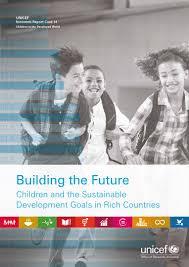
https://www.unicef-irc.org/article/1623/
Download the report here: https://www.unicef-irc.org/publications/890
This Report Card offers an assessment of child well-being in the context of sustainable development across 41 countries of the European Union (EU) and the Organisation for Economic Co-operation and Development (OECD). This group includes both high- and middle-income economies, but here we refer to them all as ‘high-income countries’ – or ‘rich countries’, for convenience. The concept of child well-being is rooted in the Convention on the Rights of the Child (CRC) but the Agenda for Sustainable Development adds new dimensions. Progress across all these dimensions will be vital to children, and advanced economies will therefore need to monitor the situation of children and young people both nationally and globally.
The Sustainable Development Goals (SDGs) agreed by the international community in 2015 represent an ambitious effort to set a global agenda for development that is both equitable and sustainable, in social, economic and environmental terms. The earlier Millennium development Goals (MDGs) prioritized the reduction of poverty, as well as progress in related social indicators. The 17 goals of the SDGs add to this a series of outcomes associated with inequality, economic development, the environment and climate change, as well as peace and security. In contrast to the MDGs, which primarily applied to low- and middle income countries, the ambitious agenda of the SDGs is of necessity universal; it thus applies to rich countries, as well as poor.

The stronger focus of the SDGs on equitable development and on leaving no one behind also demands attention to inequalities along multiple dimensions – of income and wealth, health and educational opportunity, as well as voice and political participation – both within and between countries. Addressing rising inequality and its related problems requires a focus not just on the conditions of the poorest, but also on the consequences of wealth accumulation by the richest. As countries seek to meet the SDGs, so the changing political landscape will require new approaches to ensure inclusive and sustainable outcomes.
Long-term, inclusive and sustainable social goals are best met through attention to the needs of children. Ensuring the well-being and realizing the rights of all children (including migrants and refugees) is not only a commitment made by those states that have signed the CRC, but is also an essential condition for achieving long-term development goals. Every high-income country invests in its children: healthy, educated children are better able to fulfil their potential and contribute to society. By contrast, problems of child development often carry through into adulthood, with the resulting social costs accruing to the next generation, too. Indeed, achieving the SDGs is about ensuring that future generations have the opportunities enjoyed by the present generation: successful outcomes for today’s children will build the foundations for the wellbeing of our societies tomorrow.
Commitments to the SDGs made by governments now need to be translated into programmes and public investments that can deliver on this wide-ranging set of goals and their 169 accompanying targets. While many goals require commitment at the global or multilateral action level if they are to be achieved (particularly those associated with climate change and the global economy), they also demand national action. If countries are to be held to account for their progress towards these goals, appropriate indicators for monitoring that progress are necessary. UNICEF has long been at the forefront of global efforts to monitor life outcomes and social progress for children, and it now plays a leading role in monitoring child-related SDG indicators (see Box 2: UNICEF’s global role in SDG monitoring, page 6).
Many of the SDG indicators proposed by the global community are most appropriate for lower income contexts. Report Card 14 proposes an adapted set of indicators to assess countries’ performance against the promise of “leaving no one behind” when national circumstances, ambitions and existing levels of social progress are already well advanced (see Box on the right: How have Report Card 14 indicators been selected?).
Specifically, this report seeks to bring the SDG targets for children in high-income countries into meaningful operation (while staying true to the ambitions of the global agenda) and to establish a point of departure for reviewing the SDG framework in these contexts. It focuses on those goals and targets with most direct relevance to the well-being of children in high-income settings. Where appropriate, it adapts the agreed SDG indicator, the better to reflect the problems facing children in such countries (see Table 1 pages 4-5).
Although limited by the lack of comparable data in some domains, this report compares 41 countries across 25 indicators. As in other Report Cards, countries are ranked on their achievements in well-being for children according to the selected indicators. The Report Card cannot provide an in-depth analysis of the reasons behind differences, nor of the policy options available for making progress on selected indicators. Nonetheless, by illustrating variation along key dimensions of child well-being related to the SDGs – from ending poverty to promoting peaceful and inclusive societies – it suggests areas where policy efforts or public investment may be targeted to improve outcomes, and reveals where data inadequacies still need to be addressed.










Add new comment